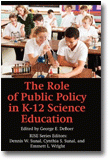
The Role of Public Policy in K-12 Science Education
Edited by:
George E. DeBoer, AAAS Project 2061
A volume in the series: Research in Science Education. Editor(s): Dennis W. Sunal, University of Alabama. Cynthia S Sunal, University of Alabama. Emmett L. Wright, Kansas State University.
Published 2011
The goal of this volume of Research in Science Education is to examine the relationship between science education policy and practice and the special role that science education researchers play in influencing policy. It has been suggested that the science education research community is isolated from the political process, pays little attention to policy matters, and has little influence on policy. But to influence policy, it is important to understand how policy is made and how it is implemented. This volume sheds light on the intersection between policy and practice through both theoretical discussions and practical examples.
This book was written primarily about science education policy development in the context of the highly decentralized educational system of the United States. But, because policy development is fundamentally a social activity involving knowledge, values, and personal and community interests, there are similarities in how education policy gets enacted and implemented around the world.
This volume is meant to be useful to science education researchers and to practitioners such as teachers and administrators because it provides information about which aspects of the science education enterprise are affected by state, local, and national policies. It also provides helpful information for researchers and practitioners who wonder how they might influence policy. In particular, it points out how the values of people who are affected by policy initiatives are critical to the implementation of those policies.
CONTENTS
Preface to the Series. Preface. Acknowledgements. Introduction to the Policy Terrain
in Science Education, George E. DeBoer. PART I: MULTIPLE INFLUENCES ON
POLICY DEVELOPMENT AND ENACTMENT. Science Education Policy and its Relationship
with Research and Practice: Lessons from Europe and the United Kingdom, Jonathan
Osborne. Science Teacher Education Research and Policy: Are They Connected?,
Jane Butler Kahle & Sarah Beth Woodruff. How do Foundations Influence
Science Education Policy? Dennis W. Cheek, and Margo Quiriconi.
How do Funding Agencies at the Federal Level Inform the Science Education Policy
Agenda? The Case of the National Science Foundation, Janice Earle. La main
à la pâte: Implementing a Plan for Science education reform in France,
Jean-Pierre Sarmant, Edith Saltiel, and Pierre Léna.
The Role of State Education Departments in Science Education Policy Development,
Dennis W. Cheek, and Margo Quiriconi. Science Education Policy and
Student Assessment, Rodger W. Bybee. How can Science Educators Influence
Legislation at the State and Federal Levels? The Case of the National Science
Teachers Association, Jodi Peterson. PART II: IMPACT OF POLICY ON CURRICULUM,
INSTRUCTION, AND THE EQUITABLE TREATMENT OF ALL STUDENTS. How State and Federal
Policy Affects What is Taught in Science Classes, George E. DeBoer. Equity
and U.S. Science Education Policy from the GI Bill to NCLB: From Opportunity Denied
to Mandated Outcomes, Sharon J. Lynch. The Effect of Educational Policy
on Curriculum Development: A Perspective from the Lawrence Hall of Science, Linda
De Lucchi and Larry Malone. PART III: POLICY IMPLEMENTATION. School
Leadership for Science Education, Richard Halverson, Noah R. Feinstein,
and David Meshoulam. About the Authors.
-
Paperback978-1-61735-224-9
Web price: $84.06 (Reg. 98.89)
-
Hardcover978-1-61735-225-6
Web price: $89.24 (Reg. 104.99)
- eBook9781617352263

-
 Physics Teaching and Learning
Challenging the Paradigm
Physics Teaching and Learning
Challenging the Paradigm
-
 Reform in Undergraduate Science Teaching for the 21st Century
Reform in Undergraduate Science Teaching for the 21st Century
-
 Research Based Undergraduate Science Teaching
Research Based Undergraduate Science Teaching
-
 Science and Service Learning
Science and Service Learning
-
 Teaching Science with Hispanic ELLs in K-16 Classrooms
Teaching Science with Hispanic ELLs in K-16 Classrooms
-
 The Impact of State and National Standards on K-12 Science Teaching
The Impact of State and National Standards on K-12 Science Teaching
-
 The Impact of the Laboratory and Technology on Learning and Teaching Science K-16
The Impact of the Laboratory and Technology on Learning and Teaching Science K-16

